#he shouldn't even be a judge on this case let alone an attorney
Explore tagged Tumblr posts
Text
In which Persephone is told she can't game the system- (TEXT EDIT)
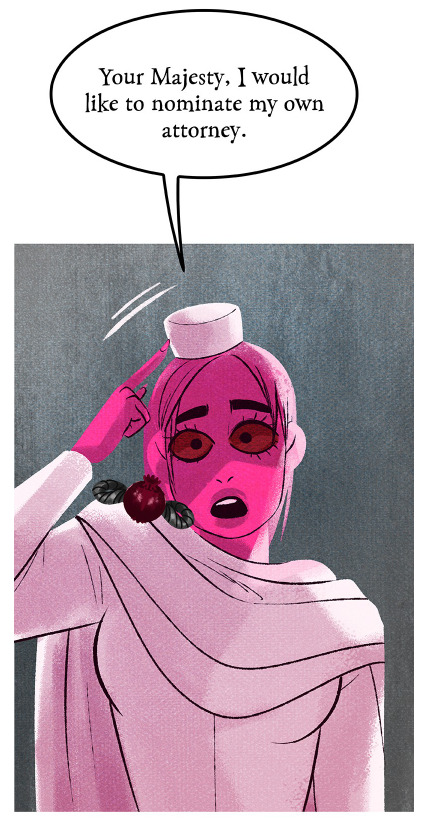
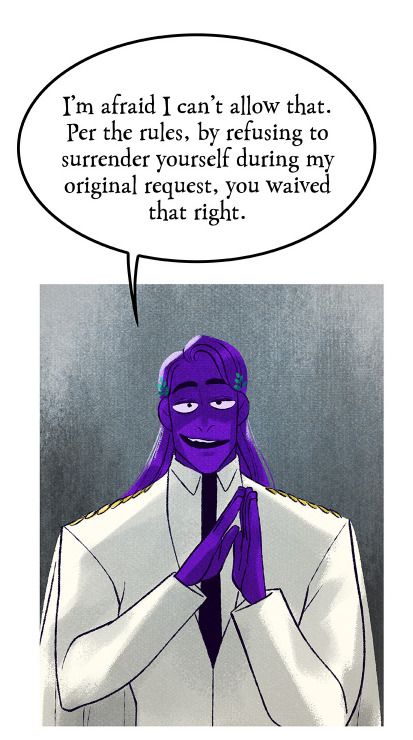
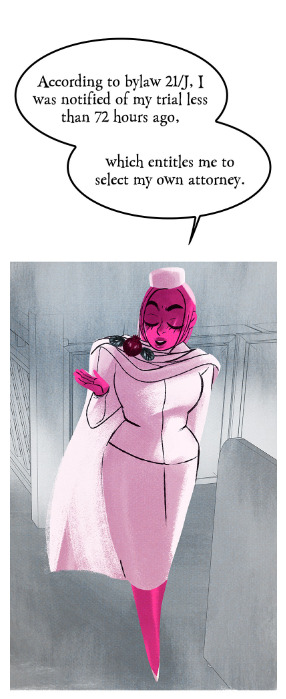

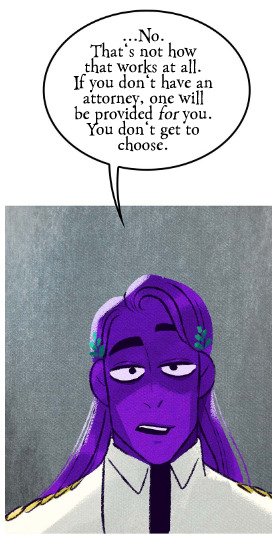
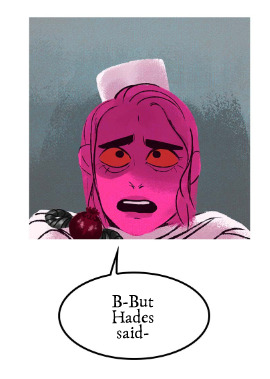

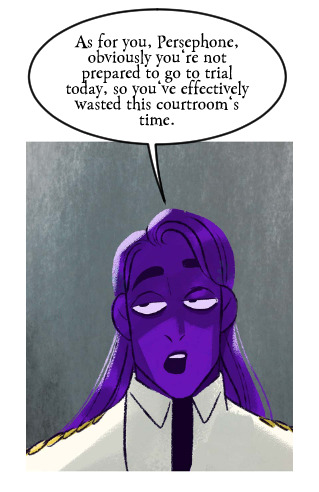
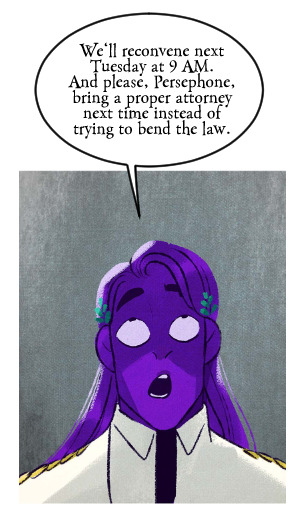
no art was edited here, just text to make this more realistic to how this scene WOULD have gone if it was an actual courtroom with real rules LOL I find it a little weird that Rachel wrote a courtroom drama arc like this and then twisted it this much to benefit Persephone because like... clearly she was inspired by courtroom drama shows, and I can't help but wonder if she got all of her basic courtroom knowledge from like, Spongebob or some shit LOL
#it literally could have been a forum or something a little more#idk#GREEK ???#get tf outta here persephone#choosing your own boyfriend as your attorney#he shouldn't even be a judge on this case let alone an attorney#wtf was zeus thinking#where the FUCK is athena#athena would never let this happen#this edit means a lot to me because the trial arc was basically my canon event where I started to doubt LO and Rachel#like i had had so much suspension of disbelief up until persephone chose hades to be her attorney LOL#and then the eris twist was the last straw#lo critical#anti lore olympus#lore olympus critical#antiloreolympus
418 notes
·
View notes
Text

« rewind. / pause. / fast forward. »

you can't believe yourself right now.
and judging about yanfei and shinobu's faces, you could say that they were surprised as well.
"are you sure?" yanfei was quick to ask, a worried expression coated over her face. "me and heizou could take DILUC’s case with no problem."
"don't worry about it," you mustered up, trying to put your brace face on. "i-i like a challenge..."
not wanting to seem too pushy, the pink-haired girl decided to leave you alone for now. though, it didn't stop her from noticing the way you tripped up on your words. "alright... but there is somebody you'll work with! mr. ragnvindr decided to hire two attorneys for this case, so it shouldn't be too bad! besides, you might be spending a lot of time in the office here since he's going to meet the two of you personally! it's just like orientation... just more higher stakes."
it only took a glance at shinobu's general direction for her to stop talking.
"anyway," the green-haired woman picked up what yanfei had left off. "he usually comes a little bit later to the office, but i'm sure he wouldn't mind giving you a brief tour of our firm- ah, he's right there."
you were a wee bit excited, and you couldn't deny that. that little bit of information really did cheer you up, even if shinobu hadn't meant it like that.
immediately, you circled back to when you were just entering the legal firm just minutes before. oh, what was he like-?
you've got to be kidding yourself right now.
unfortunately, you didn't get the time to add more questions once you heard the front door shut. widening your eyes at the all too familiar figure, you weren't able to contain a small gasp.
there he was, in his tall, grandpa-ass lookin' hair glory.
"ALHAITHAM."
you were a little bit surprised to see him widen his eyes slightly, but that was to be expected. at this point, he probably wasn't sure if you even bothered to learn his name.
"[name]," he greeted, and one look into his multi-colored his eyes is enough for it to be obvious he's up to no good. "strange, i thought you would refer to me as 'you,' as per usual."
fuming after only one sentence had been exchanged, you started walking up to him, much to the confusion of yanfei and shinobu in the background. "well you didn't have to bring that up."
"oh, really now? i wouldn't want to be caught being dishonest."
"why you-!"
"okay!" shinobu was quick to step in between the two of you just in case things managed to escalate from there. "let's keep this professional. i'm not exactly in the right mindset to deal with heizou, itto, and... whatever this is."
"right."
"naturally."
did he have to one up you every chance he gets?! regardless, you but back your groan and retort—you weren't about to lose your job and your mind after five measly minutes.
"good, good... we all agree on something," she sighed in relief, then looking up toward alhaitham. "can you show [name] around here? i could already tell that you two don't want to spend any more time than you have to, but it should only take a few minutes."
"i wouldn't mind. though, i guess the question is... would you?"
why is he so goddamn aggravating?!

↳ take the tour.
↳ get straight to work.

𝐥𝐨𝐯𝐞 𝐢𝐭 𝐬𝐨 𝐟𝐚𝐫? 𝐩𝐥𝐞𝐚𝐬𝐞 𝐫𝐞𝐛𝐥𝐨𝐠 𝐭𝐡𝐞 𝐬𝐭𝐚𝐫𝐭 𝐩𝐚𝐠𝐞! <𝟑

#𝐠𝐞𝐧𝐬𝐡𝐢𝐧 𝐢𝐦𝐩𝐚𝐜𝐭 𝐬𝐡𝐨𝐰𝐢𝐧𝐠𝐬 𝐰𝐢𝐭𝐡 𝐚𝐫𝐢𝐞.!#𝐧𝐨𝐰 𝐬𝐡𝐨𝐰𝐢𝐧𝐠: [𝐲𝐨𝐮'𝐫𝐞 𝐟𝐨𝐮𝐧𝐝 𝐠𝐮𝐢𝐥𝐭𝐲! 𝐟𝐨𝐫 𝐬𝐭𝐞𝐚𝐥𝐢𝐧𝐠 𝐦𝐲 𝐡𝐞𝐚𝐫𝐭...!].!
16 notes
·
View notes
Text
Congress Shouldn't Turn the Copyright Office Into A Copyright Court
While most people are focused on net neutrality, surveillance, and tax reform, a few legislators are quietly mulling over a different problem: copyright reform.
Five years ago, Representative Bob Goodlatte, chair of the House Judiciary Committee, launched a series of hearings and studies that he said would lead to comprehensive copyright reform. EFF and many others testified on the merits and problems in virtually every facet of copyright law, and we all waited expectantly for the “Next Great Copyright Act.” For better or worse, that dramatic reform never happened. Instead, we got the CASE Act, a bill to create a small claims process for copyright. The impetus behind this bill comes largely from photographers and other visual artists, who want a way to bring small-value copyright claims with lower expenses. They are legitimately concerned that the cost of litigation puts strong copyright protection out of reach for many artists.
But the CASE Act is not the right solution. First, it would create a new quasi-court within the Copyright Office. Aside from the constitutional questions that raises, the Copyright Office is not known for its neutrality on copyright issues. Second, the powers given to this new tribunal would invite gamesmanship and abuse. Third, it would magnify the existing problem of copyright’s unpredictable civil penalties. Finally, it would put this new tribunal in charge of punishing DMCA abuse, but sharply limit the punishment available, undermining what little deterrent effect still exists in the statute.
Let’s break it down.
The CASE Act Would Turn the Copyright Office Into a Copyright Court
The current bill, the “CASE Act of 2017” (H.R. 3945), would set up a “Copyright Claims Board” within the Copyright Office, staffed by three judges called “Claims Officers” and empowered to hear copyright complaints from all over the country. Proceedings at the Claims Board would be voluntary, but if a respondent fails to opt out, the proceedings become binding, and the outcome can be enforced in federal court. The Board can issue damages awards of up to $15,000 per work infringed, or $30,000 per proceeding. If the parties consent, it can also issue “agreements to cease infringing activity” that become binding injunctions.
Unfortunately, the Copyright Office has a history of putting copyright holders’ interests ahead of other important legal rights and policy concerns. We fear that any small claims process the Copyright Office conducts will tend to follow that pattern.
The CASE Act’s “opt-out” approach, which attempts to make the process more palatable by allowing defendants to choose to go to federal court instead, doesn’t help. If the process required respondents to give affirmative consent, or “opt-in,” the Copyright Office would have greater incentive to design proceedings that safeguard the respondents’ interests, and clear standards that everyone can understand. Equally importantly, an opt-in approach would help ensure that both participants affirmatively choose to litigate their dispute in this new court, and help prevent copyright holders from abusing the system to obtain inexpensive default judgments that will be hard to appeal (grounds for appeal are sharply limited).
More Automatic Civil Penalties, No Need to Show Harm
The bill would make copyright’s already unfair and unpredictable civil penalty regime even worse. Current law lets courts award civil penalties, known as statutory damages, of up to $150,000 for each copyrighted work infringed. These penalties go to the copyright holder, but aren’t tied to any measure of actual harm. In fact, copyright holders don’t have to introduce any evidence at all to show that they were harmed by an infringement (or that the infringer profited). Statutory damage awards vary wildly from one case to the next, making copyright lawsuits a game of financial Russian roulette for defendants.
Under current law, statutory damages do have a small safety measure attached: they’re not available for works that weren’t registered with the Copyright Office in a timely way. That rule is important because copyright applies automatically to creative works the moment they’re fixed in a tangible form. The timely registration rule limits the universe of works that are eligible for statutory damages. The CASE Act would throw that safety away. While the Act limits the damages available in a single proceeding, it allows statutory damages of up to $7,500 for works that were not timely registered. That makes countless millions more works eligible for automatic, no-proof-required civil penalties. It’s worth noting that a majority of U.S. states limit small claims to $6,000 or less.
Congress needs to fix copyright’s broken civil penalty regime. Indeed, both the former U.S. Register of Copyrights and a Department of Commerce task force have called this a priority. But instead of making statutory damages more fair and predictable, the CASE Act simply multiplies the problem.
Subpoenas To Unmask Anonymous Speakers
The CASE Act would also give the new “Copyright Claims Officers” the power to issue subpoenas to service providers for the “identification of an alleged infringer.” While backers of this legislation will likely claim that this provision simply replicates what’s already available in federal court, there are dangerous differences here. In federal court, civil subpoenas can normally only be issued after a plaintiff has demonstrated that they have a viable case. The federal courts have decades of experience crafting appropriately limited subpoenas, and supervising their use. In copyright cases, courts have begun to take extra care before issuing subpoenas to service providers to unmask an accused infringer, when circumstances suggest the information will be used to harass, or to coerce settlements based on dubious claims.
Under the CASE Act, it’s not clear that the careful limitations and safeguards established by the federal courts—limits that apply equally to every kind of legal claim—will apply in the new quasi-court. Instead, the bill seems to give the Copyright Office broad power to shape how these subpoenas will work, including how broad they can be. The Copyright Office would be empowered to decide how subpoenas can be issued, what they can contain, and “the obligations of a service provider who is issued a subpoena” — without following federal court procedures and protections. The bill doesn’t even clearly require that a copyright holder state a plausible claim of copyright infringement before requesting a subpoena—a basic requirement in federal court. Without that requirement, even a specious or pretextual accusation of copyright infringement could be used to unmask anonymous speakers.
It’s certainly possible that the Copyright Office could create a completely new set of subpoena rules that protect anonymous speech—or import the appropriate federal court precedent. But given the Copyright Office’s persistent stance of elevating copyright holders’ interests over other speech interests, granting the Office such broad authority would be reckless. The right to speak anonymously on the Internet is one of the most important speech protections we have, and the CASE Act would jeopardize it.
Copyright “Parking Tickets” — Due Process Optional
While the CASE Act establishes some court-like procedures, it also gives the Copyright Office permission to disregard those procedures as long as the amount of damages being sought is $5,000 or less (which is at or above the maximum small claims amount in 21 states). For those claims, the Copyright Office would be empowered to make new procedural rules, potentially with little or no protections for people accused of infringement. As Public Knowledge points out in their analysis of the bill, knowledgeable defendants will opt out of such proceedings, while legally unsophisticated targets, including ordinary Internet users, could find themselves committed to an unfair, accelerated process handing out largely unappealable $5,000 copyright parking tickets. Proceedings under this “small small claims” regime could be a boon for copyright trolls who pursue thousands of low-value settlements based on dubious claims of infringement, as it would give their efforts the imprimatur of a government body.
It’s true that federal litigation for small-dollar-value disputes generally isn’t practical. The federal courts impose costly, sometimes unnecessary burdens on nearly all who use them. But much of that expense comes from procedures that promote fairness, established and refined through years of use in all types of cases, not copyright infringement suits alone. Creating a parallel track that allows copyright holders to dispense with those procedures as a privileged category of litigants just doesn’t make sense.
Sidelining Section 512(f)
The bill would also authorize the tribunal to decide Section 512(f) claims. The DMCA’s takedown procedure provides a quick, cheap, extrajudicial way to censor online speech. As we’ve written many, many times before, this makes it a tempting tool for those who wish to remove speech they happen to dislike. To prevent such abuse, Section 512(f) of the DMCA provides victims of wrongful takedowns with a remedy, allowing them to file a lawsuit for misrepresentation and, if they succeed, recover damages—including attorneys’ fees.
There are at least two problems with putting the Copyright Office in charge of policing DMCA abuse. First, the courts have so far interpreted Section 512(f) to turn on whether there is evidence that the notice sender subjectively knew the targeted use was actually lawful. That issue will often be too complicated for the small claims process, and shouldn’t be decided by a historically biased agency. Second, damages are limited to what is otherwise available under the CASE Act, undermining Section 512(f)’s deterrent effect (this is the flip side of the damages issue discussed above).
The CASE Act’s flaws are fundamental, and with all that Congress is or could be doing to fix copyright law and safeguard the open Internet, this bill is the wrong move at the wrong time.
from Deeplinks http://ift.tt/2ngm2nb
0 notes